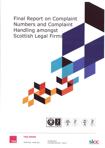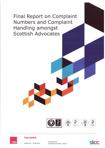Research into Complaint Numbers and Practitioners' Handling of Complaints
In June 2012, TNS BMRB produced two reports following research commissioned by the SLCC. Specifically, the research looked at complaint numbers and the methods adopted by practitioners (both solicitors and advocates) in how they handle complaints made against them.
The research, the first of its kind in Scotland, was intended as an initial fact-finding exercise. As such, it has highlighted scope for further work which the SLCC will undertake as part of its on-going oversight role.
David Buchanan-Cook, the SLCC's Head of Oversight, welcomed the reports:
"While the reports show that complaint levels are low, they are increasing. Complaints have a direct impact on any business, so it's surprising that more practitioners don't take simple steps to listen and to put matters right. The reports show that in a quarter of complaints resolved a simple apology was all that was needed yet a large number of practitioners faced with a complaint do nothing at all. In these cases both the complainer and the practitioner lose out."
He added, "The reports do highlight that it can be more challenging for smaller firms and sole practitioners to deal with complaints in terms of resources, processes and experience. We will be working with both the Law Society and the Faculty of Advocates to draw up best practice guidance later this year to help. We will also be using the reports to identify where we can help the profession to improve complaint handling. The public has a right to expect complaints to be listened to and where something has gone wrong, the practitioner should put it right. It's not just a question of fairness- it's good business sense too."
Philip Yelland, Director of Regulation at the Law Society of Scotland, said: "The research is interesting and we are looking forward to working with the SLCC on the work flowing from this."
In response to the research, Richard Keen QC, Dean of the Faculty of Advocates provides:
"The Faculty of Advocates takes its responsibility for complaints handling extremely seriously and notes from the report that the level of complaints to new cases is "undoubtedly low." The Faculty will study the report and engage with the SLCC in taking forward a number of broad themes that have been identified."

